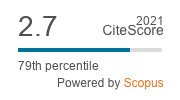A modified subgradient extragradient method for equilibrium problems to predict prospective mathematics teachers’ digital proficiency level
Keywords:
Strong convergence, Pseudomonotone equilibrium problem, Data classification problem, Digital proficiency level, Educational data classification AMS Subject Classification: 65K15, 47H05, 49M37, 97M10, 97C70, 97U70Abstract
Numerous research in the field of education analytics has attempted to discover a significant indicator and predictor of the digital proficiency level of pre-service teachers. While university course alterations in their academic performance are perceived as ordinary, significant fluctuations in their academic performance in courses related to digital technology may require further investigation and
consideration, particularly regarding their digital proficiency level. However, such a method is problematic due to the complexities of describing digital academic paths. In this paper, we modify the extragradient method with an inertial extrapolation step and viscosity-type method to solve equilibrium problems of the pseudomonotone bifunction operator. Under the assumption that the bifunction
satisfies the Lipchitz-type condition in real Hilbert spaces, we obtain strong convergence theorem. Next, we apply our algorithm to classify the digital proficiency level of pre-service teachers in order to investigate the correlation between academic achievement in digital technology-related courses and digital proficiency level. Finally, we establish several situations in which the digital proficiency level of pre-service teachers might either increase or decrease.
References
Galindo-Dominguez, H., and Bezanilla, M.J., Digital Competence in the Training of Pre-service Teachers: Perceptions of Students in the Degrees of Early Childhood Education and Primary Education. J. Dig. Learn. Teach. Educ. 37, (2021), 262–278.
UNICEF Thailand. Available online: https://www.unicef.org/thailand/stories/school-reopening-how-teachers-and-students-are-adjusting-new-normal-thailand (last accessed on 30 July 2022).
Calder, N., Jafri, M., and Guo, L., Mathematics Education Students’ Experiences During Lockdown: Managing Collaboration in eLearning. Educ. Sci. 11, (2021), 191.
Perry, T., Indon, M., and Cordingley, P., Remote and Blended Teacher Education: A Rapid Review. Educ. Sci. 11, (2021), 453.
Ahshan, R. A Framework of Implementing Strategies for Active Student Engagement in Remote/Online Teaching and Learning during the COVID-19 Pandemic. Educ. Sci. 11, (2021), 483.
Bonafini, F.C., and Lee, Y., Investigating Prospective Teachers’ TPACK and Their Use of Mathematical Action Technologies as They Create Screencast Video Lessons on iPads. TechTrends. 65, (2021), 303–319.
Hill, H.C., Rowan, B., and Ball, D.L., Effects of Teachers’ Mathematical Knowledge for Teaching on Student Achievement. Am. Educ. Res. J. 42, (2005), 371–406.
Khairiree, K., Online Learning and Augmented Reality: Enhancing Students Learn Transformation Geometry during the Covid-19 Pandemic. In proceedings of the 25th Asian Technology Conference in Mathematics, Virtual, Online, (2020), 304–313.
Barlovits, S., Jablonski, S., Lazaro, C., Ludwig, M., Recio, T., Teaching from A Distance—Math Lessons during COVID-19 in Germany and Spain. Educ. Sci. 11, (2021), 406.
Chirinda, B., Ndlovu, M., Spangenberg, E., Teaching Mathematics during the COVID-19 Lockdown in A Context of Historical Disadvantage. Educ. Sci. 11, (2021), 177.
Muu, L. D., Oettli, W., Convergence of an Adaptive Penalty Scheme for Finding Constrained Equilibria. Nonlinear Anal. Theory Methods Appl. 18, (1992), 1159–1166.
Korpelevich, G., The Extragradient Method for Finding Saddle Points and Other Problems. Matecon. 12, (1976), 747–756.
Tran, D. Q., Dung, M. L., Nguyen, V. H., Extragradient Algorithms Extended to Equilibrium Problems. Optimization 57, (2008), 749–776.
Van Hieu, D., Halpern Subgradient Extragradient Method Extended to Equilibrium Problems. Revista de la Real Academia de Ciencias Exactas, Fisicas y Naturales. Serie A. Matematicas 111, (2017), 823–840.
Kraikaew, R., Saejung, S., Strong Convergence of the Halpern Subgradient Extragradient Method for Solving Variational Inequalities in Hilbert Spaces. J. Optim. Theory Appl. 163, (2014), 399–412.
Moudafi, A., Viscosity Approximation Methods for Fixed-points Problems. J. Math. Anal. Appl., 241, (2000), 46–55.
Muangchoo, K., A New Strongly Convergent Algorithm to Solve Pseudomonotone Equilibrium Problems in a Real Hilbert Space. J. Math. Computer Sci. 24, (2022), 308–322.
Polyak, B.T., Some Methods of Speeding Up the Convergence of Iteration Methods. USSR Comput. Math. Math. Phys. 4, (1964), 1–17.
Shehu, Y., Izuchukwu, C., Yao, J. C., Qin, X., Strongly Convergent Inertial Extragradient Type Methods for Equilibrium Problems. Appl. Anal. 2021, 1–29.
European Commission. Available online at: https://educators-go-digital.jrc.ec.europa.eu/ (accessed March 9, 2022).
Tiel, J. V., Convex Analysis: An Introductory Text, 1st ed., Wiley: New York, NY, (1984).
Xu, H. K., Iterative Algorithms for Nonlinear Operators. J Lond Math Soc. 66, (2002), 240–256.
Maingé, P. E., Strong Convergence of Projected Subgradient Methods for Nonsmooth and Nonstrictly Convex Minimization. Set-Valued Anal. 16, (2008), 899–912.
Huang,G. B., Zhu, Q. Y., Siew, C. K., Extreme Learning Machine: Theory and Applications. Neurocomputing, (2006), 489–501.
Tibshirani, R., Regression Shrinkage and Selection via the Lasso. J. R. Stat. Soc. Series B. Stat. Methodol. 58, (1996), 267–288.
Han, J., Kamber, M., Pei, J., Data Mining: Concepts and Techniques, 3rd ed., Morgan Kaufman Publishers: Waltham, MA, (2012), 978.
Leoste, J., Lavicza, Z., Fenyvesi, K., Tuul, M., Oun, T., Enhancing Digital Skills of Early Childhood Teachers Through Online Science, Technology, Engineering, Art, Math Training Programs in Estonia. Front. Educ. 7, (2022), 894142.
Trainin, G., Friedrich, L., Deng, Q., The Impact of a Teacher Education Program Redesign on Technology Integration in Elementary Preservice teachers. CITE 18, (2018), 692–721.
Angers, J., Machtmes, K., An Ethnographic-Case Study of Beliefs, Context Factors, and Practices of Teachers Integrating, Qual. Rep. 10, (2005), 771–794.
Guzey, S. S., Roehrig, G. H., Teaching Science with Technology: Case Studies of Science Teachers’ Development of Technology, Pedagogy, and Content Knowledge. CITE 9, (2009), 25–45.
Downloads
Published
How to Cite
Issue
Section
License
Copyright (c) 2023 Results in Nonlinear Analysis

This work is licensed under a Creative Commons Attribution 4.0 International License.



